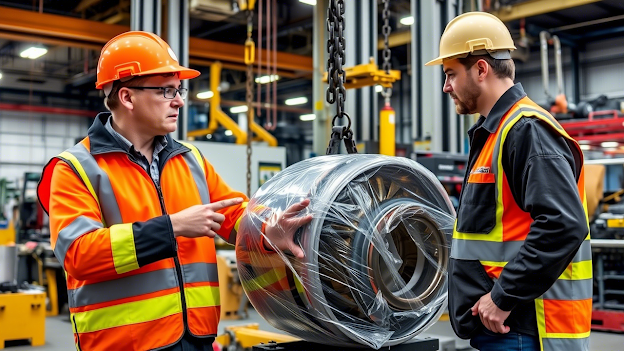Top 5 Reasons to Use VCI Stretch Film in Your Packaging Process
Introduction
Protecting metal components from corrosion is a major
concern in contemporary industrial packaging. VCI stretch film
is essential in this situation. We'll discuss how VCI stretch film improves
packaging by providing active corrosion protection, particularly in delicate
environments, in the first 100 words. VCI stretch film, which has been
mentioned five or six times here, is a barrier that has been scientifically
engineered to emit corrosion inhibitors. This is complemented by developments
in flexible laminate rolls and supply knowledge from producers of LDPE shrink
film, both of which raise packaging standards across sectors.
What Is
VCI Stretch Film?
A Quick
Overview
Volatile Corrosion Inhibitor stretch film is referred to as
VCI stretch film. Its purpose is to wrap and shield metal components while they
are being stored or transported. When the film is applied, VCI molecules are
released, forming a protective layer that stops rust on metal surfaces.
How It
Differs from Standard Stretch Films
VCI stretch film, in contrast to regular plastic wraps,
provides chemical protection without the need for extra rust-proof coatings or
oils. This minimises labour and cleanup in addition to saving time.
Reason 1:
Superior Corrosion Protection
Active
Molecular Defense
VCI stretch film is primarily used by industries because of
its proactive corrosion protection. The film creates an invisible shield by
continuously releasing vapour that adheres to metal surfaces.
Ideal for
Multiple Metals
VCI stretch film is a flexible solution that works well with
a variety of materials, including copper, brass, and aluminium.
Reason 2:
Enhanced Packaging Efficiency
One-Step
Application
VCI stretch film eliminates the need for extra paper or
anti-corrosion sprays. To secure and safeguard the product, only one wrapping
operation is required.
Reduced
Downtime
VCI stretch film speeds up assembly line and production
processes because it doesn't need to be cleaned or degreased after unwrapping.
Reason 3:
Compatibility with Flexible Laminate Rolls
Seamless
Integration
Because of their resilience and barrier qualities, flexible laminate rolls
are utilised in a variety of packaging procedures. In addition to the
mechanical and barrier strength that laminates offer, VCI stretch film adds
corrosion resistance.
Packaging
Line Optimization
Together with flexible laminate rolls, businesses can create
a multi-layered protective environment that is ideal for long-term storage or
exports.
Reason 4:
Cost-Effective Long-Term Investment
Reduced
Product Damage
Significant losses in reputation and inventory can result
from corrosion damage. VCI stretch film provides peace of mind by lowering
returns and complaints.
Longer
Shelf Life
Businesses can save money on raw materials and extend the
shelf life of stored components by using fewer protective materials.
Reason 5:
Contributions from LDPE Shrink Film Manufacturers
Film
Manufacturing Expertise
The quality and dependability of VCI stretch film are
enhanced by the extensive experience in film extrusion and polymer science that
LDPE shrink film manufacturers bring to the table.
Hybrid
Film Innovation
Some producers of LDPE shrink film are working with chemical
engineers to develop hybrid VCI-shrink films, which combine corrosion and
shrink resistance into a single product.
Visit also: The
Significance of Agricultural Film Manufacturers in the Current Smart Farming
Sector
Environmental
Benefits of VCI Stretch Film
Cleaner
Alternative to Oils
Oils and greases are frequently used in traditional rust
prevention techniques. These materials are removed by VCI stretch film, which
makes the procedure safer and cleaner.
Reduced
Waste
The film promotes sustainability because it is recyclable
and doesn't require throwaway papers or oils.
Applications
of VCI Stretch Film
Automotive
Industry
safeguards engines, gears, and other metal parts while they
are being exported.
Heavy
Machinery
used to package spare parts and machine parts.
Electronics
and Tooling
Corrosion protection is beneficial for high-precision metal
tools and circuits.
How to
Apply VCI Stretch Film Properly
Ensure
Clean Surface
To guarantee that the VCI molecules adhere properly, clean
the metal surface before wrapping.
Wrap
Tightly and Evenly
Stretch the film to make as much contact as possible with
the product, then firmly seal the edges.
Store in
Controlled Environments
Steer clear of intense heat or sunlight as these conditions
can deteriorate the film's qualities.
Comparisons
to Other Films
VCI Film
vs. LDPE Shrink Film
VCI stretch film offers rust prevention in a unique way,
whereas LDPE shrink film manufacturers concentrate on shrinkability and
protection from dust or moisture.
VCI Film
vs. Flexible Laminate Rolls
VCI stretch film performs exceptionally well in
anti-corrosion applications, while flexible laminate rolls are more robust and
superior for structural protection.
Final
Thoughts
VCI stretch film is a crucial component of contemporary
packaging, especially for sectors that depend on metals that don't corrode. A
strong, effective, and environmentally friendly packaging approach is produced
when combined with flexible laminate rolls and knowledge from LDPE shrink film
producers.
FAQs
What does
VCI in VCI stretch film stand for?
Volatile Corrosion Inhibitor is what VCI stands for. By
releasing a vapour that prevents rust, it aids in protecting metal surfaces.
Can VCI
stretch film be recycled?
Depending on the material composition, a variety of VCI
stretch film types can be recycled.
How do
flexible laminate rolls support corrosion prevention?
They enhance the anti-corrosion function of VCI stretch film
by offering mechanical and barrier protection.
Are LDPE
shrink film manufacturers involved in VCI film production?
Nowadays, some producers of LDPE shrink film
work together to create hybrid VCI-shrink products.
What
industries benefit most from VCI stretch film?
VCI stretch film is most useful in the metalworking
industries of electronics, tooling, automotive, and aerospace.



Comments
Post a Comment